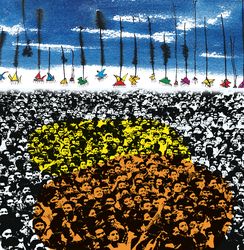We Indians have more festivals than any other people. Yet, we have no national festival, only national holidays on I-Day and R-Day. Even Diwali, which many think is pan-Indian, is not celebrated in several corners. As a child who grew up in central Kerala, I knew Deepawali only as the day on which my grandfather had his birth star of Chithira (Chitra), a day plus or minus. I would bet a million banned notes at a Diwali card party that most revellers don’t know the panchang month and tithi on which Diwali falls. Leave it, let them have fun. Nor do I know.
We have a national festival, but it comes once in five years. It can be celebrated earlier, if our rulers will so. It is our elections, the festival of democracy.
Indians love elections. Most people do, but none of them has the kind of colour, melody and medley of an Indian election. The earth turns divine territory. Our ruling gods, as also the aspiring Asuras, come to the earth with folded hands, promise the most, smile the most, meet the most and fete the most.
Sixty countries are holding national polls this year. That’s a number that will not be reached again till 2048, says a US thinktank. The list includes India the largest democracy, the US the oldest, Bangladesh our nearest, Pakistan the toughest, European Union the fairest, and many more. There will also be the warring Russia and Ukraine (if the latter chooses), the threatened Taiwan, the unstable South Sudan, the stabilised Tunisia, the oil-rich Venezuela, and more.
Political pundits, killjoys, say that democracy is not just elections. Indeed, democracy is also the way the people are ruled after elections. Most democracies fail in this. Tyrants have come to power through polls. Didn’t Hitler? All the same, elections are the best tests for a democracy. If people get to vote freely and fairly, it is half the votes won.
Like success, democracy has many fathers. The Greeks claim to have developed democracy; the Romans soon copied it, as they did the gods. Of late, India has been claiming to have mothered democracy, having had republican janapadas in the fifth century BCE and earlier, the sangams in the south and more. Some say, the Harappans, whose ruins haven’t yielded anything royal or monarchical, might have been living in trading republics. Many tribes claim to have been practising democracy for centuries. Look at the Afghan jirgas and shuras.
Were these democracies inclusive? The Greeks kept slaves who were denied political rights, as were women. The same with the Romans, copycats! India didn’t practise slavery, but Buddhist texts say our janapadas had a ruling caste (rajas) and a working class (dasas). Then there was the chaturvarna system that prescribed different rights for different castes. That goes against the democratic principle of equal rights.
The English claim to have mothered the elected parliament, but Iceland’s parliament is older. And it was when the Brits denied polls to own people in the colonies that the Americans set up what is now claimed to be the oldest modern democracy.
The Yanks trade in democracy. Their first export was to France. French troopers, who had gone to help the colonists against the colonialists, returned to France and told the masses about democracy. The masses got inspired, stormed the Bastille, and set up a series of republics. In the melee, a few hundred heads rolled.
Export of democracy is an idea that the US tries when a tyrant somewhere turns against them. They put export curbs when the tyrant turns their friend.
prasannan@theweek.in


